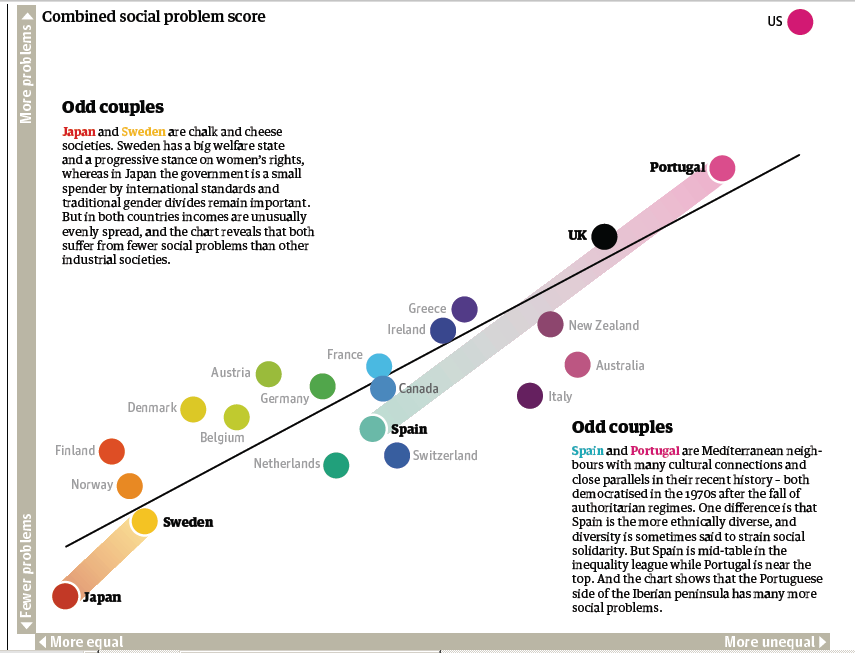Sing we a song of high revolt
 Justin Dodd
Justin Dodd  Tuesday, August 17, 2010 at 07:40AM
Tuesday, August 17, 2010 at 07:40AM You may have already come across the book The Spirit Level: Why Equality is Better for Everyone. In essence, it is an accessible academic study which draws on statistical analysis from 23 rich countries and 50 US states. The conclusions only confirm what we knew to be rationally true: the most pressing health and social problems of wealthy states are anything from 3 to 10 times more acute in unequal societies. There are a number of explanations for this including the profound psychological effects of inequality. It makes for compelling reading.
But how has this work by acclaimed academics Richard Wilkinson and Kate Pritckett been greeted? Initially, the mood was one of great excitement across the political spectrum. The Spirit Level has sold more than 36000 copies in the UK alone and has been read and praised by David Cameron, Michael Gove, Jack Straw and David Milliband to name but a few. This early bipartisan reception was very encouraging for Wilkinson and Pickett who had intended for the analysis to transcend the “leftwing ghetto”. Alas, it was not to last. The first assault came from the Taxpayers Alliance who labeled it “flimsy” and “absurd”. Next to weigh in was the thinktank Policy Exchange with a report entitled “Beware false prophets.” Right-leaning columnists from the Spectator and the Daily Telegraph offered their poisoned arrows including the catchy description “junk food for the brain.”
Christian communities should be disappointed but not entirely surprised by this series of events. In the marketplace of ideas, equality has always been deeply threatening. It is not something we instinctively strive for as human beings given that it strikes at the very heart of self-preservation. The Spirit Level and its mixed reception is a reminder to us of the urgency of authentic Christian witness in our time. Proclaiming the life-giving power of “love your neighbour as yourself” is an obligation that will sadly never leave us.

The Christian Gospel is not one of complacency or cultural complicity. It is driven by a revolution of intuition. Jesus’ message and actions subvert the social norms of his culture as well as the illusion of absolute self-preservation. He heals on the Sabbath, eats with tax collectors and prostitutes, identifies with an unclean culture (the Samaritans), encourages the rich man to sell all he has in order to find true salvation and preaches “blessed are the meek, for they will inherit the earth” (Matthew 5:5) from a mountain top.
It is apt that this debate reached intensity in the month we celebrate the feast day of the Blessed Virgin Mary (15 August). Congregations across the nation would no doubt have heard the highly recognisable Magnificat or Song of Mary (Luke 1:46-55) during worship. Though, how many of us would even have registered the radical content of this clarion call for equality. A prayer of the early church, the writer of Luke’s gospel literally puts words into the mouth of Mary. Words that are intended to incite a painful cultural shift and remind the disciples of Jesus that they should constantly strive to incarnate these values. Perhaps the more modern interpretation of the Magnificat in a hymn by Fred Kaan will help unseat our familiarity:
Sing we a song of high revolt;
Make great the Lord, his name exalt:
Sing we the song that Mary sang
Of God at war with human wrong.
Sing we of him who deeply cares
And still with us our burden bears;
He, who with strength the proud disowns,
Brings down the mighty from their thrones.
By him the poor are lifted up:
He satisfies with bread and cup
The hungry folk of many lands;
The rich are left with empty hands.
He calls us to revolt and fight
With him for what is just and right
To sing and live Magnificat
In crowded street and council flat.






